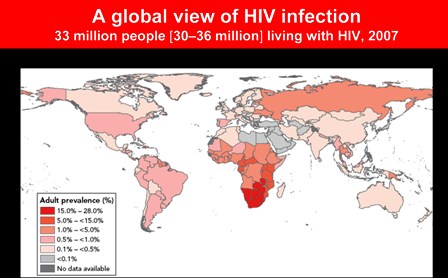Global HIV prevention efforts insufficient
July - August, 2008 | Volume 7, Issue 4
Although UNAIDS is reporting major gains in prevention of new HIV infections in several countries most affected by the epidemic, two Fogarty grantees are warning that "global prevention efforts remain woefully insufficient" and that "radical behavior changes" must be encouraged.

Map reprinted by permission of UNAIDS
In The Lancet articles released at the 17th annual International AIDS Conference, grantees Thomas Coates and Dr. Michael Merson emphasized that prevention strategies must be reinvigorated.
Merson estimated that half the world's projected 7-to-16-million infections could be prevented by 2015. "... [The] sad truth is that global prevention efforts remain woefully insufficient, as reflected by the fact that key prevention services currently reach less than 10 percent of individuals at risk worldwide," Merson said.
Calling for "combination prevention," Coates said, "HIV prevention is neither simple nor simplistic. We must achieve radical behavioral changes - both between individuals and across large groups of at-risk people - to reduce incidence. Once achieved, it is essential that such changes are sustained."
The UNAIDS report credited increased condom use among young people who have multiple sex partners and a delay in first-time sexual intercourse as two examples of behavior change examined in Burkina Faso, Cameroon, Ethiopia, Ghana and Malawi, Uganda and Zambia.
More Information
To view Adobe PDF files,
download current, free accessible plug-ins from Adobe's website.